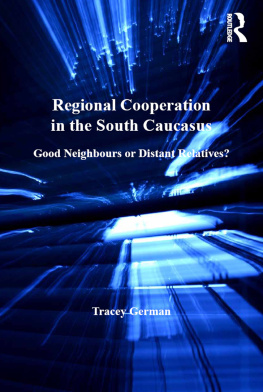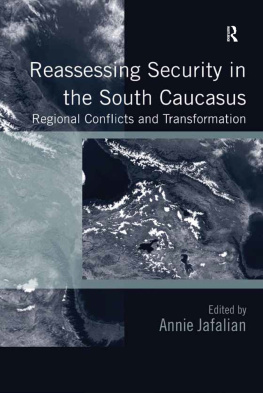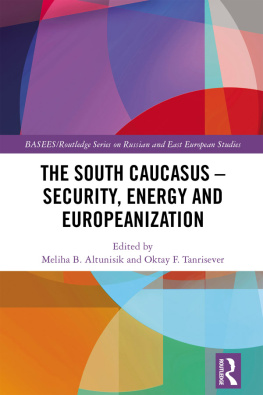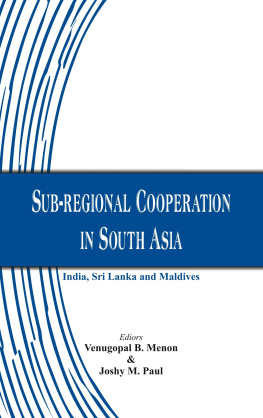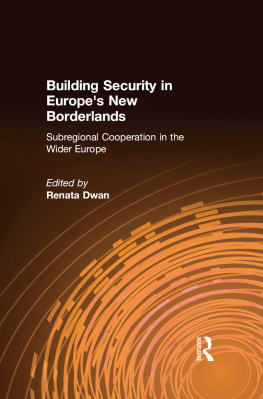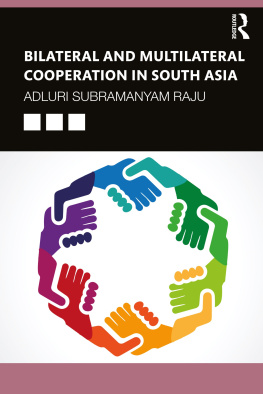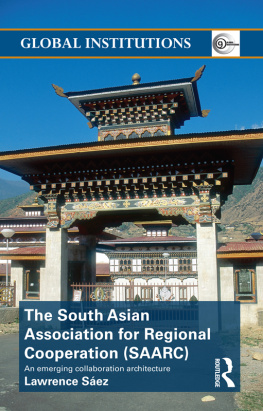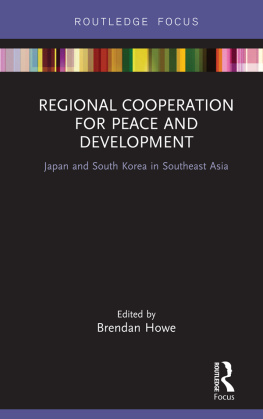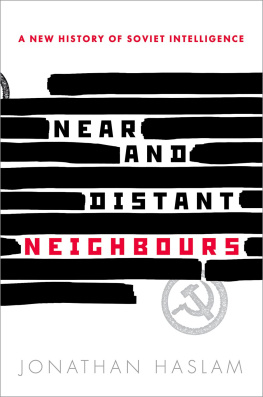First published 2012 by Ashgate Publishing
Published 2016 by Routledge
2 Park Square, Milton Park, Abingdon, Oxon OX14 4RN
711 Third Avenue, New York, NY 10017, USA
Routledge is an imprint of the Taylor & Francis Group, an informa business
Copyright 2012 Tracey German
Tracey German has asserted her right under the Copyright, Designs and Patents Act, 1988, to be identified as the author of this work.
All rights reserved. No part of this book may be reprinted or reproduced or utilised in any form or by any electronic, mechanical, or other means, now known or hereafter invented, including photocopying and recording, or in any information storage or retrieval system, without permission in writing from the publishers.
Notice:
Product or corporate names may be trademarks or registered trademarks, and are used only for identification and explanation without intent to infringe.
British Library Cataloguing in Publication Data
German, Tracey C., 1971
Regional cooperation in the South Caucasus : good neighbours or distant relatives?. 1. Caucasus, SouthForeign relations1991 2. InterregionalismCaucasus, South. 3. National securityCaucasus, SouthInternational cooperation. 4. Security, International Caucasus, South. 5. Caucasus, SouthPolitics and government1991
I. Title
Library of Congress Cataloging-in-Publication Data
German, Tracey C., 1971
Regional cooperation in the South Caucasus : good neighbours or distant relatives? / by Tracey German.
p. cm.
Includes bibliographical references and index.
ISBN 978-1-4094-0721-8 (hardback : alk. paper)
1. Caucasus, SouthForeign relations1991 2. Caucasus, SouthPolitics and government1991 3. RegionalismCaucasus, South. 4. Regionalism (International organization)Caucasus, South. 5. Security, InternationalCaucasus, South. I. Title.
DK509.G49 2012
327.475dc23
2012003867
ISBN 9781409407218 (hbk)
ISBN 9781315604404 (ebk)
Chapter 1
Introducing the South Caucasus
In a speech to the United Nations General Assembly in September 2010, Georgian President Mikhel Saakashvili called for a united Caucasus, derived from a common market, shared interests, and political and economic interdependence. This aspiration, modelled on the example of the European Union (EU), constitutes the latest in a series of proposals intended to promote a united approach to regional challenges in the South Caucasus, few of which have been successfully implemented. Despite the fact that genuine regional cooperation and possible future integration could greatly increase the stability and security of the region, Saakashvilis appeal is likely to remain an aspiration rather than a reality, hindered by the geopolitical realities of the region. The South Caucasus, comprising the states of Armenia, Azerbaijan and Georgia, occupies a key strategic location, squeezed between the Black and Caspian Seas, Iran, Russia and Turkey. It constitutes a vital land bridge between Asia and Europe, physically linking the Caspian Sea region and Central Asia with the Black Sea and Western Europe, and is an important transport and communications corridor, particularly as a transit route for hydrocarbons from the landlocked Caspian Sea region to international markets. The stability of the South Caucasus is threatened by its geopolitical significance, as well as numerous transnational security challenges, including unresolved conflicts, organised crime, trafficking and migration. The scale and scope of these transnational problems require a co-ordinated regional response: deeply divided by conflict and the competing interests of regional powers, the South Caucasus would benefit from greater cross-border collaboration. However, regional cooperation is not as well developed as it could be, hampering economic development and further destabilising the area.

